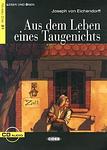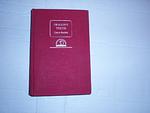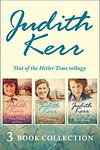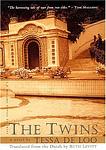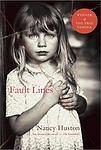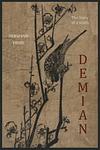The Greatest "Germany, Coming of age" Books of All Time
Click to learn how this list is calculated.
This list represents a comprehensive and trusted collection of the greatest books. Developed through a specialized algorithm, it brings together 300 'best of' book lists to form a definitive guide to the world's most acclaimed books. For those interested in how these books are chosen, additional details can be found on the rankings page.
Genres
The category of "Germany" in terms of books would encompass literature that is set in or about Germany, its history, culture, people, and society. This could include works of fiction, non-fiction, memoirs, biographies, and historical accounts that explore various aspects of German life, such as the country's politics, economy, art, music, literature, and more. The category would be of interest to readers who are fascinated by Germany's rich and complex history, its contributions to world culture, and its ongoing role in shaping global affairs.
The "Coming of age" category of books typically refers to stories that explore the transition from adolescence to adulthood. These books often focus on the challenges and experiences that young people face as they navigate the complexities of growing up, including issues such as identity, relationships, sexuality, and personal growth. Coming of age stories can be set in any time period or cultural context, and may feature protagonists of any gender, race, or background. Overall, the genre offers readers a glimpse into the universal struggles and triumphs of youth, and the process of becoming a fully realized adult.
Countries
Date Range
Reading Statistics
Click the button below to see how many of these books you've read!
Download
If you're interested in downloading this list as a CSV file for use in a spreadsheet application, you can easily do so by clicking the button below. Please note that to ensure a manageable file size and faster download, the CSV will include details for only the first 500 books.
Download-
1. The Magic Mountain by Thomas Mann
In this novel, the protagonist, a young, ordinary man, visits his cousin at a tuberculosis sanatorium in the Swiss Alps. Intending to stay for only a few weeks, he ends up remaining there for seven years, becoming a patient himself. The book explores his experiences and relationships with other patients and staff, delving into philosophical discussions on life, time, and the nature of disease. It also provides a vivid portrayal of the European society and intellectual life on the eve of World War I.
-
2. The Book Thief by Markus Zusak
Set in Nazi Germany during World War II, the novel follows the story of a young girl who finds solace in stealing books and sharing them with others. In the midst of the horrors of war, she forms a bond with a Jewish man her foster parents are hiding in their basement. The story is narrated by Death, offering a unique perspective on the atrocities and small acts of kindness during this period. The girl's love for books becomes a metaphor for resistance against the oppressive regime.
-
3. Jakob Von Gunten by Robert Walser
This novel is a first-person account of a young man who leaves his privileged life to enroll at a school for servants in Berlin. The protagonist's observations and experiences in the school, his interactions with the headmaster and other students, and his internal struggles and reflections form the crux of the story. The narrative, imbued with irony and dark humor, explores themes of power, submission, individuality, and the absurdity of societal norms and expectations.
-
4. The Reader by Bernhard Schlink
"The Reader" is a poignant narrative centered around a young German boy's complex relationship with an older woman, who later turns out to be a former Auschwitz guard. Their relationship begins with her teaching him to read, but takes a drastic turn when she disappears, only to reemerge on trial for war crimes. The novel explores themes of guilt, shame, and redemption, as the boy, now a law student, grapples with his feelings for a woman he once loved, but whose past actions he cannot reconcile with.
-
5. Wilhelm Meister's Apprenticeship by Johann Wolfgang von Goethe
"Wilhelm Meister's Apprenticeship" is a classic coming-of-age story that follows the protagonist, Wilhelm, through his journey of self-discovery. Caught between his bourgeois background and his aspirations to become an actor, Wilhelm embarks on an odyssey that introduces him to a variety of characters and experiences. The novel explores themes of love, loss, and the pursuit of artistic excellence, while also critiquing the social norms and expectations of the time.
-
6. The Life of a Good-For-Nothing by Joseph von Eichendorff
The book tells the story of a young, carefree gardener's son who is deemed a "good-for-nothing" by his father due to his dreamy and idle nature. Spurred by his desire for adventure and romantic yearnings, he leaves home to embark on a whimsical journey across various regions. Along the way, he encounters a series of picturesque and often mysterious characters and situations, which lead him through a series of adventures that ultimately guide him towards self-discovery and maturity. His travels and the people he meets help him realize the value of love, work, and purpose in life.
-
7. Demian by Hermann Hesse
The novel follows the life of a young man, Emil Sinclair, from childhood to adulthood, as he navigates the duality of his nature and the societal expectations of his time. He is influenced by a charismatic and intellectual peer, Max Demian, who introduces him to the concept of the world not as a dichotomy of good and evil, but as a unified whole. This leads Sinclair on a journey of self-discovery and spiritual enlightenment, exploring themes of identity, morality, and the subconscious. The narrative is heavily influenced by the philosophies of Carl Jung and the Gnostic tradition.
-
8. The Cement Garden by Ian McEwan
The story revolves around four siblings who are left to fend for themselves after the untimely death of both their parents. The death of their mother, the second parent to die, forces them to hide her body in the basement to avoid being separated by social services. The siblings create their own dystopian world within the confines of their home, leading to a disturbing exploration of their relationships, particularly between the two oldest siblings, as they grapple with the loss, isolation, and burgeoning adolescence.
-
9. All the Light We Cannot See by Anthony Doerr
Set during the turmoil of World War II, the novel follows the intersecting lives of a blind French girl and a German boy. The girl, living in occupied France, seeks solace in the world of books and the imagination, while the boy, a member of Hitler Youth, is a radio operator for the German forces. Their paths cross in the walled city of Saint-Malo, with the narrative exploring themes of survival, morality, and the human spirit.
-
10. Confusion by Stefan Zweig
"Confusion" is a compelling narrative that explores the intense and passionate relationship between a student and his charismatic professor. Set in the early 20th century, the story unfolds as the protagonist becomes entangled in the professor's personal life, discovering his mentor's secret past, his struggling marriage, and his hidden homosexual desires. The book presents a profound exploration of human emotions, identity, and the complexities of love, against the backdrop of the societal norms of the time.
-
11. Spring Awakening by Frank Wedekind
The book is a provocative and controversial play that delves into the tumultuous emotional landscape of adolescence. Set in late 19th-century Germany, it follows a group of teenagers as they navigate the complexities of sexuality, authority, and rebellion. The narrative exposes the repressive and hypocritical nature of the society that stifles the natural desires and questions of the young characters, leading to tragic consequences. Through its candid exploration of themes such as sexual awakening, suicide, abortion, and the critique of the educational system, the play challenges the audience to confront the damaging effects of ignorance and the urgent need for open communication and understanding between generations.
-
12. The Young Man by Botho Strauß
"The Young Man" is a philosophical novel that explores the transformation of a young man from a passive observer to an active participant in life. The protagonist, initially a detached observer of his own life and the world around him, is forced to confront his own existence and identity when he falls in love. The narrative delves into his introspective journey, his struggle with societal norms, his search for meaning and purpose, and his ultimate acceptance of his own individuality and humanity.
-
13. Dragon's Teeth by Upton Sinclair
"Dragon's Teeth" is a historical novel set during the rise of Nazi Germany, following the life of a wealthy American named Lanny Budd. Lanny, who is politically connected and fluent in several languages, becomes involved in the political intrigue of the era, including the machinations of Hitler and his inner circle. The novel explores the political, economic, and social conditions that allowed the Nazi party to rise to power, and the consequences for those who stood in its way.
-
14. When Hitler Stole Pink Rabbit by Judith Kerr
"When Hitler Stole Pink Rabbit" is a poignant and autobiographical novel that follows the life of a young Jewish girl named Anna and her family as they flee Germany in the 1930s to escape the rise of the Nazi regime. Through Anna's eyes, the book explores the challenges and hardships faced by refugees, as well as the loss of identity and sense of belonging. It is a touching story of resilience, courage, and the power of family bonds in the face of adversity.
-
15. Life is a Carawanserai Has Two Doors I Went in One I Came out the Other by Emine Sevgi Özdamar
This novel follows the life of a young Turkish girl growing up in the 1950s and 60s, exploring her experiences in a rapidly changing society. The protagonist navigates the complexities of her family life, her struggle with her identity and her eventual emigration to Germany. The book explores themes of female empowerment, cultural clashes, and the immigrant experience, all told through a unique narrative style that blends reality with dreams and folktales.
-
16. The Twins by Tessa De Loo
"The Twins" is a poignant narrative about twin sisters, separated at a young age due to the Second World War. One sister grows up in the Netherlands under Nazi occupation, while the other is raised in Germany as part of the Hitler Youth. After six decades of separation, they meet again and begin to share their experiences, discovering the impact of the war on their lives and the stark differences in their upbringing. The book explores themes of identity, loyalty, and the long-lasting effects of war on individuals and families.
-
17. The Boy in the Striped Pyjamas by John Boyne
This novel follows the story of a young boy who moves from Berlin to a house near a concentration camp during World War II. Unaware of the grim reality of his surroundings, he befriends another boy on the other side of the camp fence. The two develop a deep friendship despite the horrific circumstances, leading to a devastating and unforgettable ending.
-
18. Floating In My Mother's Palm by Ursula Hegi
The book is a poignant coming-of-age story set in a post-war German town, where a young girl navigates the complexities of her family life and the secrets of her community. Through her eyes, readers experience her relationships with colorful local characters, her discovery of love and loss, and her quest for identity amidst the lingering shadows of World War II. The narrative is a tapestry of small-town life, capturing the essence of growth and the bittersweet nature of memory, as the protagonist learns about the resilience of the human spirit and the fluidity of time, much like floating in the comforting yet unpredictable embrace of her mother's palm.
-
19. Die neuen Leiden des jungen W. by Ulrich Plenzdorf
This novel tells the story of a young man from East Germany who rebels against the societal norms and expectations of his time. The protagonist, a skilled worker, flees from his apprenticeship and his home to Berlin, where he isolates himself in a summer house, devoting his time to his passions of reading and listening to Western music. Using the narrative style of a psychological confession, the book explores themes of youthful rebellion, the search for identity, and the conflict between individual desires and societal pressures. The protagonist's tragic end underlines the oppressive nature of the East German regime.
-
20. Fault Lines by Nancy Huston
"Fault Lines" is a novel that delves into the complex layers of family history and the impact of past traumas on the present. The narrative unfolds through the eyes of four different children from successive generations of the same family, each chapter moving back in time to reveal the secrets and challenges faced by their ancestors. The story explores themes of identity, memory, and the inherited nature of suffering, as the protagonists grapple with the legacies of war, displacement, and personal tragedy that ripple through their lineage. The novel's unique structure and poignant storytelling invite readers to reflect on how the fault lines of history can shape individual lives and relationships across generations.
-
21. Beneath The Wheel by Hermann Hesse
"Beneath The Wheel" follows the story of Hans Giebenrath, a talented and ambitious young student who is sent to a prestigious boarding school. As he becomes consumed by the pressures of academic success and the expectations of his teachers and parents, Hans gradually loses touch with his own desires and passions. The novel explores themes of conformity, the damaging effects of excessive pressure, and the consequences of sacrificing one's individuality for societal approval.
Reading Statistics
Click the button below to see how many of these books you've read!
Download
If you're interested in downloading this list as a CSV file for use in a spreadsheet application, you can easily do so by clicking the button below. Please note that to ensure a manageable file size and faster download, the CSV will include details for only the first 500 books.
Download




